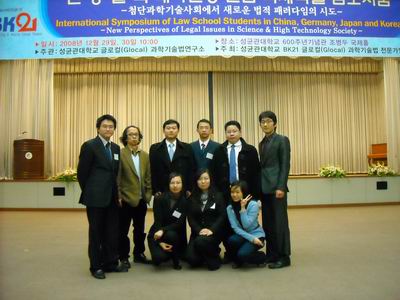沈朝晖:中德日韩法学交流研讨会(2008年底,1周)
时间:2010-04-16 来源:作者:
The Seoul International Seminar of the Post-graduates from China, Japan, Germany and South Korea (in Winter, 2008) was formal, and procedures were standard. The Sungkyunkwan University, University of Tokyo and Peking University had six students and one professor to participate it respectively. The seminar was divided into three parts: public law (including law theory, constitutional law, administrative law, etc.), private law (civil law, commercial law, economic law, etc.) and international law. Each part would occupy half a day, so the whole seminar would take 1.5 days.
Specifically, there was a special report by teachers before each part began. So there might be three special reports. After each special report, then one student presented his/her paper, and two students from other countries would comment his/her paper and raise questions while others were listening. One lecturer and two commentators constituted one group and each part was comprised of three groups. The commentators would raise many questions and lecturers need respond to them within time limit. Fortunately, most of questions had been informed to lecturers before the seminar. All presentations, comments and response must be within time limit that chairpersons would tell you before. Lastly, there was a Q and A phase for auditors. All speakers could use their own native languages with simultaneous interpretations.
Interestingly, both the interpreters were from China and pursued their Ph.D. program in Japan and South Korea respectively. After we arrived at Seoul, one of the interpreters welcomed us at the Seoul airport and helped us accommodate in international house of Sungkyunkwan University. At the first night before the seminar started, there was a party so that all the students from different countries gathered together, introduced each other in English (name, major, etc.). At this party, lecturers and commentators could gather and communicate about papers and questions. There was a book collecting all participants‘ papers and commentators in three languages (Chinese, Japanese and Korean). Communication in order to know each other‘s culture was very beneficial. And after the seminar ended, another interpreter kindly showed us around Seoul City. The Hang River is very clean and divides the city into poor and rich areas. Thanks to the two interpreters.

Specifically, there was a special report by teachers before each part began. So there might be three special reports. After each special report, then one student presented his/her paper, and two students from other countries would comment his/her paper and raise questions while others were listening. One lecturer and two commentators constituted one group and each part was comprised of three groups. The commentators would raise many questions and lecturers need respond to them within time limit. Fortunately, most of questions had been informed to lecturers before the seminar. All presentations, comments and response must be within time limit that chairpersons would tell you before. Lastly, there was a Q and A phase for auditors. All speakers could use their own native languages with simultaneous interpretations.
Interestingly, both the interpreters were from China and pursued their Ph.D. program in Japan and South Korea respectively. After we arrived at Seoul, one of the interpreters welcomed us at the Seoul airport and helped us accommodate in international house of Sungkyunkwan University. At the first night before the seminar started, there was a party so that all the students from different countries gathered together, introduced each other in English (name, major, etc.). At this party, lecturers and commentators could gather and communicate about papers and questions. There was a book collecting all participants‘ papers and commentators in three languages (Chinese, Japanese and Korean). Communication in order to know each other‘s culture was very beneficial. And after the seminar ended, another interpreter kindly showed us around Seoul City. The Hang River is very clean and divides the city into poor and rich areas. Thanks to the two interpreters.




